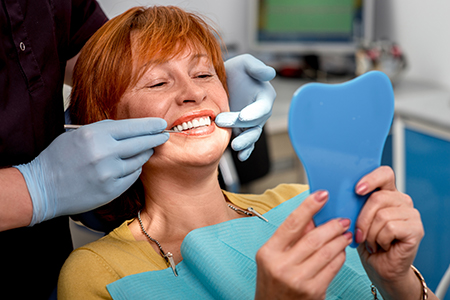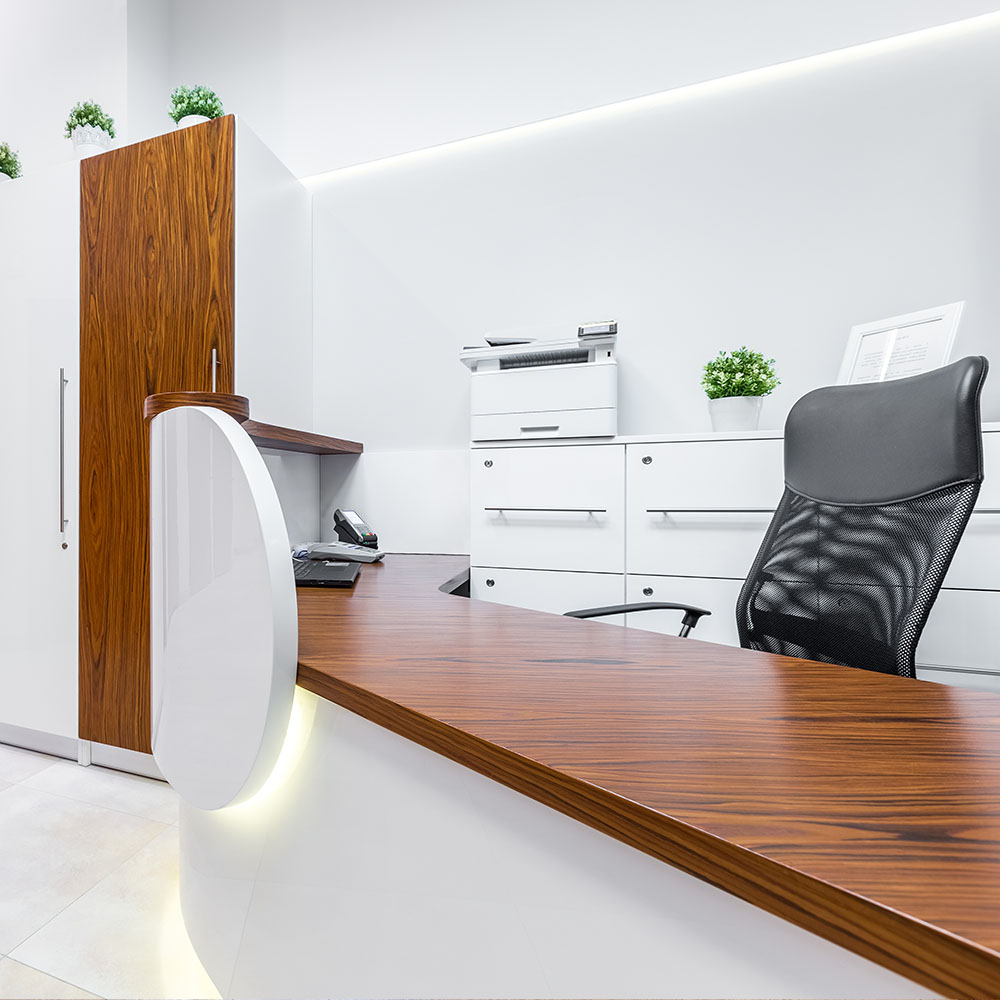New Patients
Existing Patients

Advances in materials and clinical techniques have made modern denture care more natural, comfortable, and reliable than ever before. While dental implants and fixed bridgework provide permanent options for some patients, removable dentures remain an important and flexible way to restore missing teeth and facial support. Dentures can restore function, improve appearance, and help patients regain confidence in everyday activities like speaking and eating.
At the office of Joanna Tricorache, DDS, we design dentures with attention to fit, function, and the way they harmonize with each patient’s facial features. Our approach balances form and function so prosthetic teeth look natural and support comfortable chewing and clear speech. We tailor each appliance to the patient’s oral health, preferences, and lifestyle.
Our team takes pride in providing clear explanations and step-by-step guidance so patients understand their options and what to expect throughout treatment. Whether you are exploring a partial denture to fill a few gaps or a complete denture to replace all upper or lower teeth, we aim to make the process predictable and supportive.
Losing one or more teeth affects more than the visible smile. Gaps can alter biting patterns and place extra strain on remaining teeth, which may accelerate wear or cause movement of adjacent teeth. Over time those changes can affect the way your jaw comes together and the overall balance of your bite.
Tooth loss can also change how the face appears. Teeth provide support to the lips and cheeks; without that support, soft tissues can droop and the lower face can appear shorter or sunken. Restoring tooth structure with a denture helps re-establish facial contours and supports a more youthful profile.
Beyond aesthetics, missing teeth can limit the variety of foods you feel comfortable eating and can make clear speech more difficult for some people. Addressing tooth loss sooner rather than later can prevent further complications and make it easier to maintain good nutrition and communication.
Partial and full removable dentures remain a practical and adaptable option for many patients. They provide predictable improvements in function and appearance while allowing for periodic adjustments as oral tissues change over time.

Dentures are custom-made prosthetic appliances that replace missing teeth and the surrounding gum tissue. They consist of artificial teeth attached to a base that rests on the gums; bases can be made from acrylic, composite materials, or supported by metal frameworks depending on the design. Properly made dentures restore chewing surfaces and help distribute forces across the mouth.
As removable devices, dentures can be taken out for cleaning and overnight rest. This removability can make oral hygiene easier because the gums and any remaining natural teeth can be cleaned directly. For many patients, the ability to remove and inspect the appliance is an advantage for long-term maintenance.
One major distinction among replacement options is permanence. Fixed bridges and implants provide non-removable solutions for eligible candidates, while partial and full dentures remain removable and versatile. Each choice has trade-offs related to invasiveness, support, and maintenance, and our team helps patients weigh these factors carefully.
When properly planned and fabricated, a denture can deliver a natural appearance, comfortable function, and the adaptability to be refined over time as the mouth’s tissues change.
Selecting the right denture starts with a detailed evaluation of the remaining teeth, the contours of the gums, and the condition of the jawbone. Our clinicians evaluate these factors and discuss the options that best meet a patient’s functional needs and aesthetic goals. Material choices and mechanical attachments are selected with durability and comfort in mind.
There are two broad categories of removable dentures: complete dentures that replace all teeth in an arch, and partial dentures that replace one or more missing teeth while preserving healthy natural teeth. Each category includes several design variations to meet specific clinical situations.
Complete dentures replace all teeth in the upper or lower arch. A conventional complete denture is fabricated after the gums have healed following extractions, which can yield a precise and stable fit. An alternative, known as an immediate denture, is placed at the time of extractions so the patient does not go without teeth during healing; immediate appliances typically require follow-up relines or adjustments as tissues remodel.
Immediate vs. conventional
Immediate dentures provide continuity of appearance and function right after extractions, while conventional dentures are made after healing to maximize fit. We explain the pros and cons of each approach so patients can make informed choices that suit their priorities.
Overdentures for added support
Overdentures use remaining tooth roots or attachments placed on implants to improve stability. This approach preserves jawbone and enhances retention while still allowing the prosthesis to be removed for cleaning.
Implant-retained removable dentures
For patients seeking greater stability without fully fixed restorations, implant-retained dentures attach to anchored posts. These attachments reduce movement during function and can improve comfort and chewing efficiency.
Partial dentures replace selected missing teeth and rely on neighboring healthy teeth for support. They can be crafted with clasps, precision attachments, or flexible base materials to balance retention, aesthetics, and comfort. The framework material may be cast metal for strength or flexible resin for improved comfort and appearance.
A well-designed partial denture not only fills spaces but also helps prevent drifting of remaining teeth and maintains the harmony of the bite. Our practice considers long-term tooth health when recommending the most appropriate partial design for each case.
Whatever the design, careful attention to the fit, bite relationships, and the selection of tooth shape and shade ensures prostheses that integrate naturally with a patient’s smile.

Successful denture treatment begins with a comprehensive assessment. We review medical and dental history, examine oral tissues, and often use imaging to evaluate bone levels and anatomical features that will affect fit. This diagnostic step lets us identify any preparatory care that may be needed, such as extractions or minor tissue reshaping.
Laboratory communication is another essential element. Precise impressions, careful shade selection, and trial fittings (try-ins) allow us to refine the denture’s appearance and occlusion before final delivery. These staged visits make it possible to adjust tooth position, bite height, and esthetics so the final appliance performs well and looks natural.
When a denture is ready, we verify fit, function, and comfort, and we make any necessary adjustments. Because oral tissues change over time, we also discuss maintenance schedules and how the appliance may need periodic relines or refinements to keep it fitting correctly.
Our objective is a prosthesis that fits predictably from the start and adapts easily over the years with minimal disruption to daily life.

Adapting to a new denture is a gradual process. In the first days and weeks you may notice increased saliva flow, minor soreness, or slight changes in speech. These reactions are normal and typically improve as your mouth adjusts. We recommend wearing the denture as advised and returning for any adjustments if you notice persistent pressure points.
Speaking and eating with a new appliance improve with practice. Reading aloud or practicing conversational speech can speed adaptation, while beginning with soft, easy-to-chew foods and gradually reintroducing firmer textures helps build confidence with chewing.
Proper daily care preserves both the appliance and oral health. Rinse and brush the denture after meals, use a denture brush or soft toothbrush, and soak the prosthesis overnight as recommended. Be sure to continue cleaning any remaining natural teeth and to gently care for gums and the roof of the mouth to maintain healthy tissues.
When adjustments are needed
Because the jaw and gums change over time, relines and adjustments are sometimes necessary to restore a comfortable fit. Regular follow-up visits help detect issues early and keep the denture performing well.
Options for added stability
For patients experiencing looseness, attachments to implants or specialized retention systems can improve stability. We review these solutions when increased retention is desirable for comfort or function.
Routine maintenance
Periodic professional evaluations allow us to examine fit, oral tissues, and the condition of any remaining teeth. These visits help maintain oral health and identify when proactive adjustments are needed.
Throughout the treatment journey, our practice focuses on predictable outcomes and patient comfort. If you have questions about how dentures might address your needs, our team at Joanna Tricorache, DDS is available to explain the options and guide you toward a solution that supports both function and appearance.
Summary: Dentures are a versatile and well-established way to replace missing teeth, restore facial support, and improve everyday function. If you would like to learn more about how dentures could help you, please contact us for additional information and to discuss next steps.

Today, it’s easier than ever to replace missing teeth and achieve natural-looking, durable, and long-lasting results! Depending on a patient’s dental needs, lifestyle, expectations of care, and budget, choices can include conventional fixed bridgework, dental implants, or removable partial and complete dentures. At the office of Joanna Tricorache, DDS, we’ll discuss all your options in care and answer all your questions as you choose the solution that’s right for you.
With advances in dental materials and technology, today’s dentures are more comfortable and realistic-looking than ever before.
Whether you wear partial or complete dentures, it’s essential to see the dentist for routine care. Besides checking the fit and condition of your dentures and making any necessary adjustments, you’ll also receive a comprehensive exam to check on the health of any remaining teeth as well as the soft and hard tissues in and around the oral cavity.
A same-day denture offers an accelerated design and fabrication process that allows a patient to go from impression taking to denture insertion in a single day.
For patients who don’t want to wait after having teeth extracted, an immediate denture can be inserted the same day your teeth are removed. Sometime later you may need the denture relined to address any changes in its fit once the extraction sites have completely healed.
While no one wants to drop or break a partial or complete denture, accidents do happen. The good news is that in some cases, your partial or complete denture is reparable. It all depends on the extent of the damage. Don’t hesitate to contact our office if you’ve broken or damaged your denture. We’re happy to help.
The simple act of taking your partial denture in and out can cause certain types of metal clasps to loosen over time. When you come in for your checkup visit or contact our office for an adjustment, we’ll assess the fit of your partial and tighten the clasps for improved stability and comfort.
While rebuilding a complete smile is a worthwhile investment, our office is sensitive to the costs involved in dental care. We customize care and will discuss which treatment options address your needs, lifestyle, and budget. How much a new denture will cost depends on the type of the prosthesis, its design, and the materials used to fabricate the supportive base, teeth, and clasps or precision attachments. Dentures that include the placement of dental implants for added retention and stability typically involve additional costs.
If you have dental insurance, your coverage may include a new or replacement set of dentures. Our staff is happy to review your coverage with you to ensure you are maximizing your insurance benefits while minimizing any out of pocket expenses.
At the office of Joanna Tricorache, DDS, we provide an extensive range of dental services, including the latest and most effective methods to help patients with missing teeth rebuild complete and beautiful smiles. As skilled and experienced professionals, we recognize that every patient is different, and every smile is unique. We’re passionate about what we do and take great pride in providing personalized treatment plans while treating our patients as valued partners in care.

Ready to schedule your next dental appointment or have questions about our services?
Contacting Joanna Tricorache, DDS is easy! Our friendly staff is available to assist you with scheduling appointments, answering inquiries about treatment options, and addressing any concerns you may have. Whether you prefer to give us a call, send us an email, or fill out our convenient online contact form, we're here to help. Don't wait to take the first step towards achieving the smile of your dreams – reach out to us today and discover the difference personalized dental care can make.